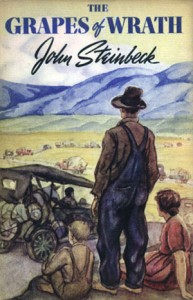[contextly_auto_sidebar id=”7Ob2euleB2pS7V1InChacTlQDk4kH4s8″]
ONE of the things that’s most baffled and frustrated me over the last few years has been our collective inability or unwillingness to grapple with the recession and the growing crisis on inequality in a meaningful, imaginative way. Journalism has not done a great job, on the whole, and the movies have almost completely whiffed on  this one, as I wrote here.
this one, as I wrote here.
A smart new piece in Pacific Standard looks at contemporary fiction, asking “The Heirs of Steinbeck: Who Are the Fiction Writers Taking on Poverty and Inequality Today?” From Anna Clark’s story:
Despite our recession-era reckoning with economics and inequality, fiction that examines both the macro and micro experience of poverty is all too rare. Of the writers who do venture forth in the tradition of John Steinbeck, many are finding new and riveting approaches to an age-old subject. But there are crucial gaps, still. And as brilliantly as Steinbeck wrote about poverty, we cannot rely on him to comprehensively tell today’s story.
The story is pegged to Steinbeck’s Grapes of Wrath, released 75 years ago today, and recounts the novel’s original reception (denounced as communist, book burning in Bakersfield, etc.) quite colorfully. But the article’s real force comes when she moves into the present: She concludes that while novelists have mostly dropped the ball, short story writers, including Junot Diaz, have grappled with these subjects more effectively.
My favorite part about her story is its conclusion:
Today’s best fiction about poverty is brilliant about tracing the nuances of precarity—how to survive when there is nowhere else to go. But there is another story about poverty that deserves to be more fully developed for our twenty-first century: It didn’t have to be this way.
I’ll conclude myself by pointing out that economic and political issues are only two on the subjects that drive fiction writers: Some of our finest, past and present, concentrate on other things. But when an entire nation, as Clark argues here, overlooks something central to so many lives, it makes you wonder if the American Dream and decades of Horatio Alger stories (and neoliberal myths) have blinded us. More on this later.
ALSO: Thanks to a recent conversation with Dean Wareham of Luna, I’ve been turned on to a young L.A. transplant from Wales named Cate Le Bon. Her music brings two of my favorite styles together quite tunefully: British folk and the melodic side of the Velvet Underground. I could see this fusion ending quite badly, but in Le Bon’s hands, the melodic and slightly dissonant qualities of both work together perfectly. Check out her recent album Mug Museum. She goes on tour later this month.

Stumbled across this book recently that does tackle the recession’s effects on middle America. No happy ending here, but a thought provoking read.
http://www.amazon.com/Sanctity-Revenge-Brian-Schnoor/dp/0986297410/ref=sr_1_1?ie=UTF8&qid=1418359833&sr=8-1&keywords=brian+schnoor